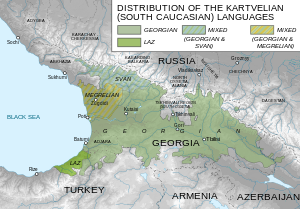Lingua laz
A lingua laz (ლაზური ნენა, lazuri nena; xeorxiano: ლაზური ენა, lazuri ena, ou ჭანური ენა, ç̌anuri ena, ou tamén chanuri ena) é unha lingua kartveliana falada polo pobo laz, que habita na costa sur do mar Negro.[1] Estímase hai que arredor duns 20 000[2] falantes nativos de laz en Turquía, nunha franxa de terra que se estende dende Melyat até a fronteira xeorxiana (oficialmente chamada Lazistán até 1925), e arredor duns 2 000 en Xeorxia.[2]
| Laz Lazuri, ლაზური | ||
|---|---|---|
| Falado en: | Xeorxia e Turquía | |
| Total de falantes: | 22 000 (2007) | |
| Familia: | Linguas kartvelianas Karto-zan Zan Laz | |
| Escrita: | Alfabetos xeorxianos | |
| Códigos de lingua | ||
| ISO 639-1: | --
| |
| ISO 639-2: | --- | |
| ISO 639-3: | lzz
| |
| Mapa | ||

| ||
| Status | ||
Notas editar
- ↑ E.J. Brill's First Encyclopaedia of Islam, 1913–1936, Volume 5. p. 21. Va6oSxzojzoC.
- ↑ 2,0 2,1 Ethnologue (ed.). "Laz".
Véxase tamén editar
| Vexa a proba da Wikipedia en Lingua laz |
Bibliografía editar
- Grove, Timothy (2012). Materials for a Comprehensive History of the Caucasus, with an Emphasis on Greco-Roman Sources. http://timothygrove.blogspot.com/2012/07/materials-for-comprehensive-history-of.html
- Kojima, Gôichi (2003) Lazuri grameri Chiviyazıları, Kadıköy, İstanbul, ISBN 975-8663-55-0 (notes in English and Turkish)
- Nichols, Johanna (1998). The origin and dispersal of languages: Linguistic evidence. In N. G. Jablonski & L. C. Aiello (Eds.), The origin and diversification of language. San Francisco: California Academy of Sciences.
- Nichols, Johanna (2004). The origin of the Chechen and Ingush: A study in Alpine linguistic and ethnic geography. Anthropological Linguistics 46(2): 129-155.
- Tuite, Kevin. (1996). Highland Georgian paganism — archaism or innovation?: Review of Zurab K’ik’nadze. 1996. Kartuli mitologia, I. ǰvari da saq’mo. (Georgian mythology, I. The cross and his people [sic].). Annual of the Society for the Study of Caucasia 7: 79-91.